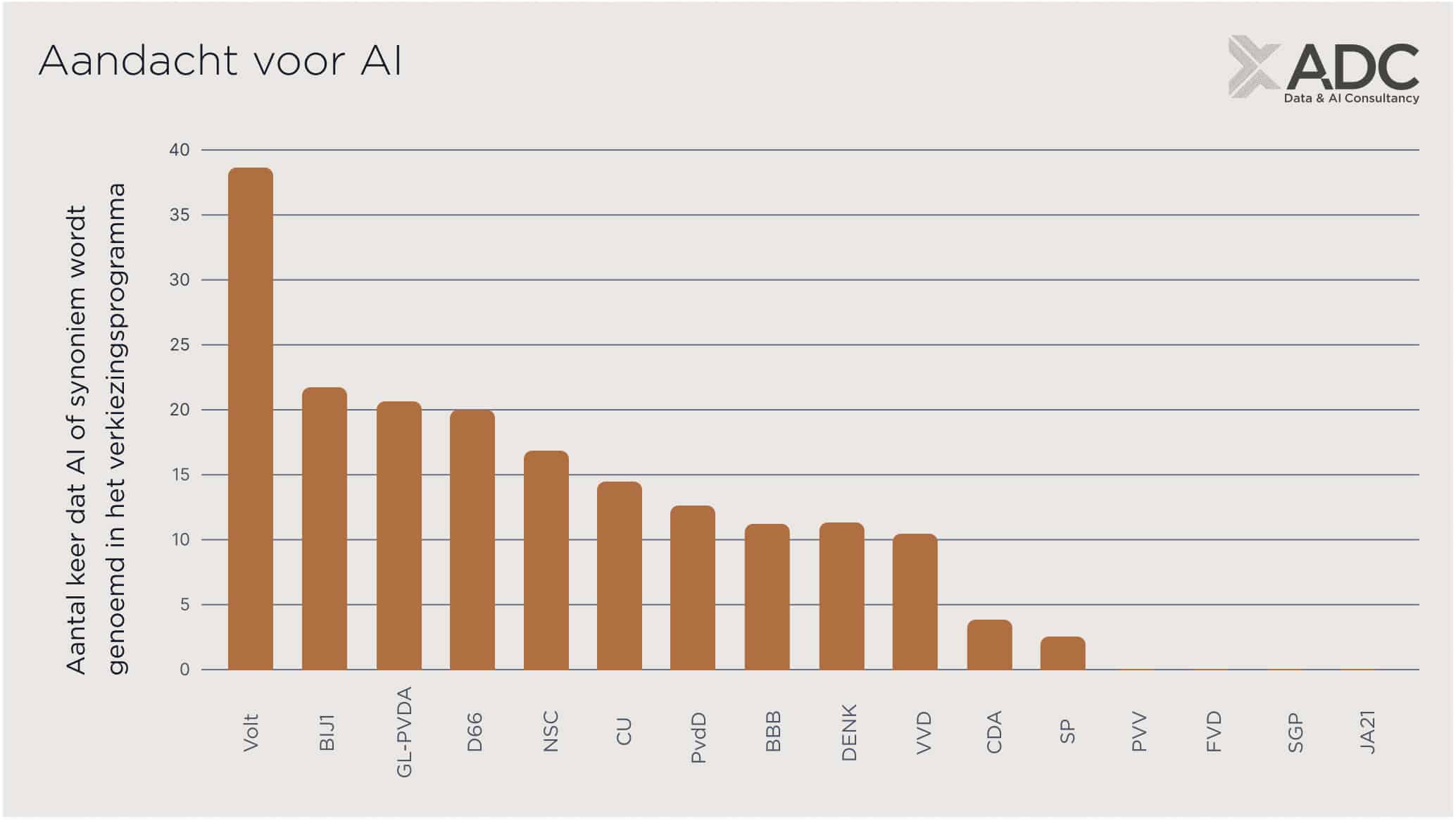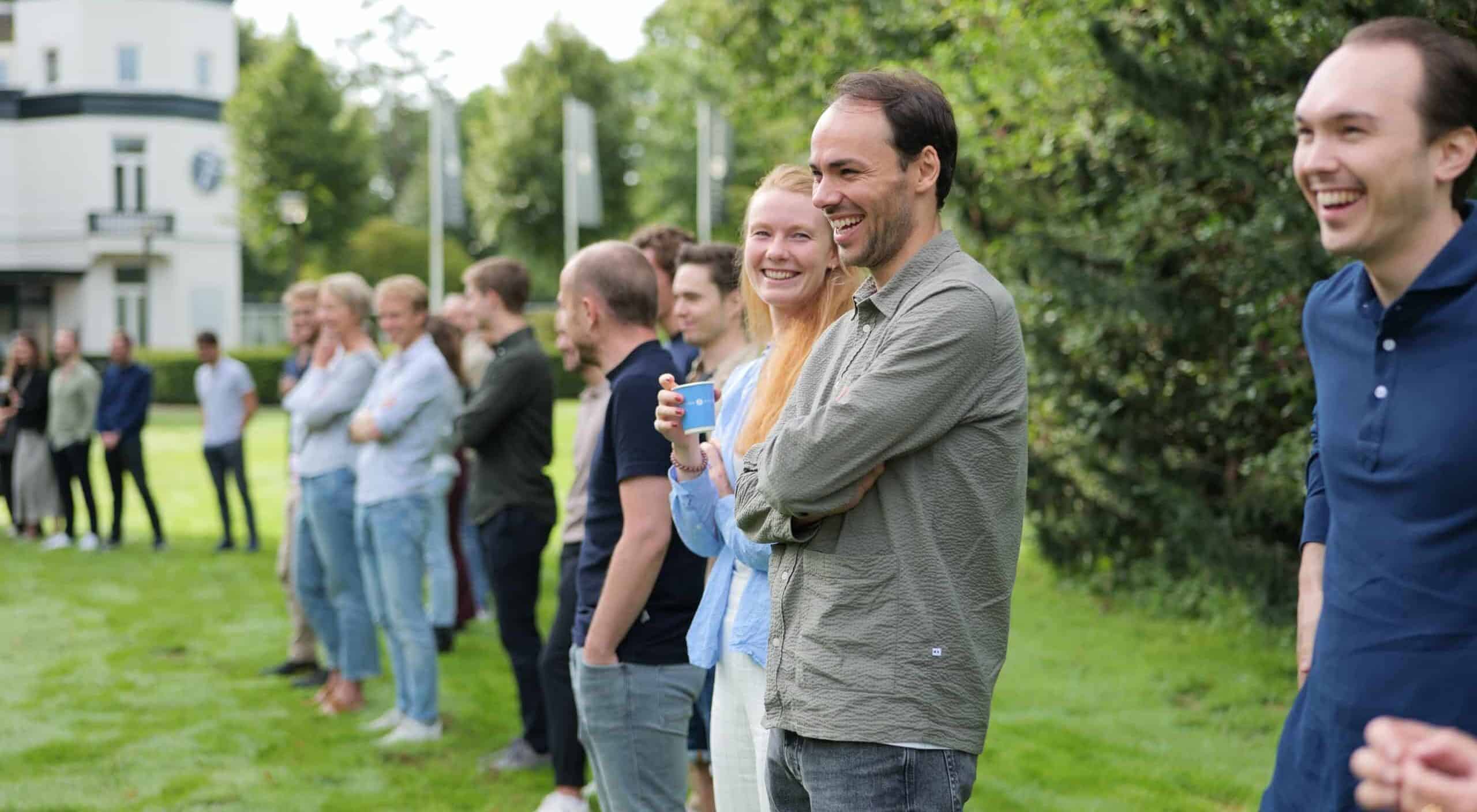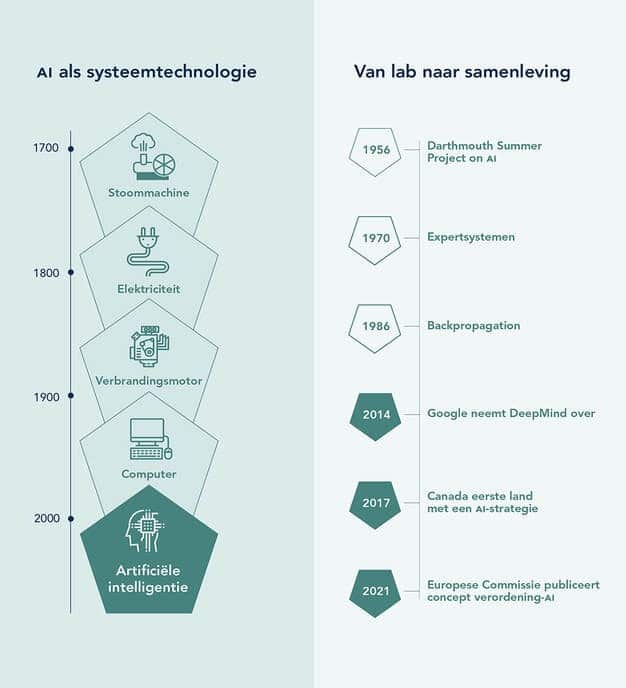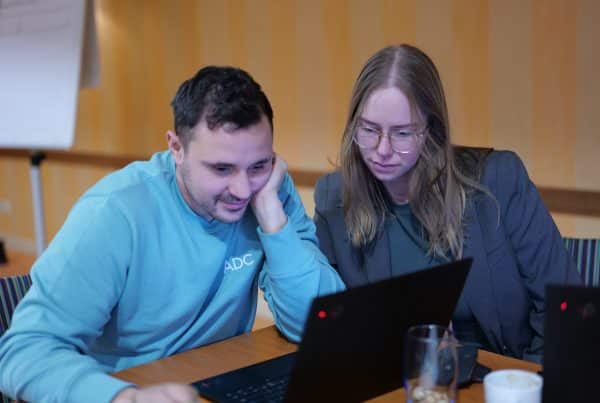Our CTO, Casper Rutjes, created an in-depth analysis of AI’s role in the upcoming Dutch political elections. This analysis explores the positions of each party, providing a detailed understanding of how AI and algorithms are viewed in Dutch politics. As technology’s influence continues to grow, understanding where political parties stand on these matters is increasingly important to make informed decisions. Keep reading to discover how a breath of fresh air from new elections can determine the course of technological progress.
AI in the upcoming Dutch elections
The House of Representatives elections of November 22, 2023 are just around the corner and will bring a wave of innovation. Numerous new party members are coming to the forefront, ready to leave their mark on the future of the Netherlands.
At the same time, global developments point to the urgent need to keep up with the times, especially in the field of technology. Now that all election manifestos are available, there is an opportunity to delve deeper into the question: How do Dutch political parties position themselves in relation to technological progress, and in particular, AI and algorithms?
Why do political parties need to address AI?
In 2021, the Wetenschappelijke Raad voor Regeringsbeleid (WRR) stated AI as a new system technology: “If the Netherlands does not prepare properly for this fundamental change, there is not only the risk that opportunities will be missed, but also that society will be saddled with a technology that does not serve our interests [translated from Dutch].”
Although many people have already tried asking for a rhyme, joke, or other gimmick in ChatGPT, AI also has a very serious side. For example, McKinsey’s most recent annual global survey (summer 2023) confirms an explosive growth of generative AI (gen AI) in companies and organisations. The expected business disruption from generative AI is significant, with respondents predicting dramatic changes to their workforce

Figure 2. Political parties’ relative attention to AI; source: ADC
Are parties standing still or being active in the age of AI?
First we will provide a quantitative analysis. The party platforms are full of comments, attention, and positions that differ in opinions. It is good that the Netherlands has many options to choose from, but it is also useful to look at what is not talked about: topics on which parties do not want to take the lead.
If you look at all the election manifestos, you will clearly see a difference: Volt leads with a vision and an entire chapter on AI, followed by BIJ1, GL-PVDA, D66, NSC, CU, BBB, DENK, and VVD with varying degrees of AI vision. Furthermore, CDA, SP, and SGP all mention a critical need a few times, and finally PVV, FVD, and JA21 remain silent on AI, hardly discussing the topic at all.
For the parties that talk about it, what do parties say about AI in their election manifestos? Keep reading to find out.
”The approaching House of Representatives elections promise to herald a new phase for the Netherlands. Technological advancements and the role of AI should not be ignored. The various party programs provide insight into the various visions and positions in this area. While some parties emphasise the opportunities that AI offers for innovation and improvement, others warn of the inherent risks, especially in the areas of discrimination and ethics. The Netherlands is at a crossroads, and the choices made now will determine how we as a country navigate the AI era. The challenge is great, but with collective effort, consultation and leadership, we can shape a future that remains both technologically advanced and humane.
Casper Rutjes (CTO, ADC)
What are the AI platforms of Dutch political parties?
Volt – discusses AI extensively, sees opportunities and wants to act responsibly
Volt sees immense opportunities for society in AI systems such as ChatGPT, but emphasises that these cannot be blindly left to the free market. The party advocates ethical AI policies at national, European, and international levels. What is striking is their proposal to give every resident their own AI chatbot free of charge, based on open-source and reliable data.
Volt further emphasises the importance of safety and education: AI systems must be certified as safe by an independent party and schoolchildren must receive basic education in AI, including coding and ethics. Transparency is of paramount importance, with mandatory disclosure of data sources by AI providers. In addition, Volt is committed to a supportive AI ecosystem, with attention to climate impact, and insists on active Dutch participation in international cooperation for ethical AI.
Partij van de Dieren – Pursues ethical and transparent AI, and modernises digital rights
The party emphasises the need for transparency in artificial intelligence (AI) and demands that AI providers disclose their methods. Any AI development must be ethically assessed and AI-generated content must be clearly recognisable.
The party aims to modernise copyright with the rise of AI-created art. They demand that security services reveal their algorithmic use without ethnic profiling. Furthermore, the party supports a pause of at least six months in the development of AI systems stronger than GPT-4 and is committed to international cooperation on security measures.
BIJ1 – Strongly emphasises the risks and concerns, and wants immediate mitigation
BIJ1 emphasises that current systems disproportionately disadvantage marginaliaed groups. Furthermore, BIJ1 proposes an immediate stop on developing AI for military purposes due to concerns about discrimination in AI data and algorithms. To promote fair AI, a regulatory body is proposed to assess AI systems against human rights before they come to market.
In addition, BIJ1 wants a holistic approach to tackle tech companies that abuse advanced AI. This includes tackling mis- and disinformation, preventing discrimination and guaranteeing the rights of original data sources.
BBB – Focuses on information when making decisions: measurement and practical experience over (AI) models
BBB attaches great importance to providing early information about the digital society, both at primary education level and beyond. They warn of the formation of ‘echo chambers’ fueled by AI and algorithms. While AI’s potential is recognised, blind faith in models is also criticised.
For BBB, human decision-making should always be central and models should only serve to support, not replace, factual research. They emphasise that a country should not be led by models or spreadsheets and that citizens are not files. Practical, measured knowledge is of great importance to BBB in decision-making and policy, and they attach great importance to insights from practice, such as those of hunters and farmers.
GL-PVDA – Mainly focuses on technological research, digital infrastructure, and AI supervision
GL-PVDA emphasises an ethical and sustainable approach to AI. They advocate transparent, safe AI systems that respect human rights and are energy efficient. Strong EU investments in technological research are encouraged, as well as the development of a European digital infrastructure as an alternative to Big Tech.
The party focuses on digital sustainability and a European supervisory body for AI, with the Netherlands taking the lead in responsible AI initiatives at a global level. The consciously addictive design of social media is being restricted.
DENK – Mainly speaks out against digital discrimination with strict rules and robust supervision
DENK is determined to combat digital discrimination and the possible adverse effects of algorithms and risk models. To address these challenges, DENK aims to introduce an Algorithms Law, which prohibits the use of ancestry-based data in algorithms and provides strong safeguards. DENK wants to strengthen the Dutch Data Protection Authority with more resources and binding powers to effectively supervise algorithms and to combat discrimination and privacy violations.
At the European level, DENK sees the need to review and strengthen current regulations in order to effectively resist large technology companies. Remarkably, DENK sees potential in the development of a digital racism detector, an algorithm aimed at detecting discrimination and racism on the internet.
D66 – Sees plenty of opportunities, but with a strong emphasis on transparency, ethics, and open research data
D66 sees great potential in technology and AI, such as drones for sustainable agriculture, algorithms for fair distribution of facilities, and AI for medical innovations. The party emphasises the importance of transparency, ethics, and justice in technological developments.
Notably, D66 advocates making research data public to accelerate scientific progress and prevent paywalls. At the same time, they insist on mandatory testing of algorithms, combating discrimination and critical assessment of the revenue model of social media companies, especially because of their possible negative impact on children.
VVD – Beyond AI pilots, context-dependent AI deployment and measurement above model
The VVD sees a prominent role for AI within the Netherlands and Europe and wants to make maximum use of this potential, where care and recognition of risks are essential. The VVD strives for international cooperation on AI use by companies and governments. They emphasize the importance of transparency in data and algorithm use, whereby citizens retain control over their data.
In the nature and environmental sector, they argue for direct measurements over models to monitor actual impact. In the healthcare sector, they see digitalisation and AI as crucial tools for efficiency and job satisfaction. At the same time, they want to combat online polarisation and extremism by restricting algorithms on social media. The emphasis is on actual implementation over testing grounds and pilots, given the belief that technology has already proven to be valuable.
NSC – Critical of the use of algorithms and blindly relying on (AI) models
NSC is critical of the use of algorithms, especially within government. They emphasise the risks of automated decision-making and the importance of transparency and accountability. They warn against blindly relying on AI models, citing crises in which such models played a questionable role.
The NSC advocates scientific standards for whether or not to use models in policy making. They also express concerns about the dependence on large American tech companies and the dominance in AI and cyber security. The party believes that a boost should be given to the tech industry in the Netherlands and the EU to reduce this dependence.
CDA – Sees opportunities and advocates for more transparency and legal protection
The CDA sees opportunities in AI, provided it respects our values and standards. Technological innovations must comply with this at both European and national level. CDA proposes to expand the Constitution with fundamental digital rights, such as the right to transparency and the right to ownership of data .
The CDA also advocates more transparency and legal protection regarding automated decision-making by the government. International treaties of the UN, the EU, and the Council of Europe must also be adapted to human rights protection in the digital age.
SP – Justice first: protection of rights and strengthening of independent media
The SP is strongly against discrimination by the government, such as with the Tax Authorities. The use of fraud detection algorithms must comply with human rights.
The party also emphasises the importance of independent media; threats against journalists are dealt with strictly. Furthermore, they strive for supervision of social media algorithms, with special attention to regional and local media.
CU – Reflection on AI, regulation of algorithms, and strengthened supervision of digital security
The CU advocates an in-depth reflection on the role of AI, especially in relation to education and the development of young people. Organisations that use algorithms must be transparent about the data used and the measures taken to prevent discrimination.
CU wants to transform the Dutch Data Protection Authority into a powerful watchdog for digital security, with special attention to child protection. Within healthcare, CU sees opportunities for AI, especially as a tool for doctors in diagnostics, but emphasises that the doctor is ultimately responsible, as well as the crucial importance of patient privacy and the prevention of commercial data use.
SGP – Protection, awareness, and balance in AI
SGP emphasises the protection of children’s rights and is against AI applications that coerce or mislead children. The party advocates the use of app blockers following the French example and wants stricter rules for the sale of risky AI systems abroad. They underline the importance of investing in AI to limit the influence of China and the US.
Want to continue the discussion?
If you are interested in discussing AI in the Dutch elections further or talk about your organisation’s AI challenges, feel free to reach out to Casper.

What stage is your organisation in on its data-driven journey?
Discover your data maturity stage. Take our Data Maturity Assessment to find out and gain valuable insights into your organisation’s data practices.








